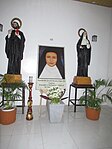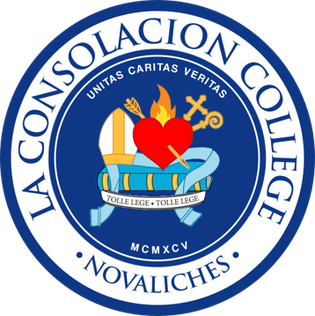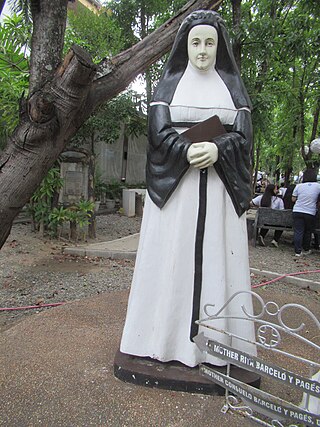Life and Mission
Barcelo y Pages was born on July 24, 1857, in Sarriá, Barcelona, Spain, to Salvador Barceló y Roces and Maria Pagés y Campanya. [1] Her siblings were Salvador, Joaquin, Ana Maria and Ignes Joaquina Vicenta, (the future Mother Rita Barceló).
Joaquina studied for fourteen years and was an intern at the Colegio de las Esclavas del Sagrado Corazon de Jesus (The Slaves of the Sacred Heart of Jesus) in Barcelona.
Despite her outgoing personality, she felt a calling to the contemplative life like her eldest sister, Ana Maria. She entered the Monasterio de las Comendadoras de San Juan de Jerusalén in Barcelona. The recurrence of an abscess in her knee forced her to leave the monastery. However, when the Beatas Agustinas were invited to go to the Philippines to take care of young girls, orphaned because of the cholera epidemic, her desire for convent life was rekindled. [2]
She entered the Beaterio de Mantelatas de San Agustin of Barcelona as a postulant and joined the second group of Beatas who left for Manila on September 1, 1883, and reached Manila on October 5, 1883. [1]
On November 21, 1883, she received the Augustinian habit of the tertiary order at the chapel of the orphanage in Mandaluyong. She was given the name Sor Maria de la Consolacion and was called Sor Consuelo upon her entrance to the novitiate. [1]
Her profession of temporary vows was initiated despite questions from the Archbishop of Manila and Sor Antonia Campillo, the superior. The Augustinian priests pushed through with the simple ceremonies in the chapel of the Asilo in Mandaluyong on December 26, 1884. Her sponsor was Doña Maria del Carmen Ayala de Roxas. Sor Consuelo was the first peninsular woman, that is, a lady born in Spain, to be clothed and to profess as a Beata in the Philippines. [3] At the Asilo, she provided the children with food, shelter, clothing, and education. She also spent a great deal of time giving music lessons. She had a gift of making the girls feel at ease with her.
When the local community was divided into two, Sor Consuelo opted to remain in the Asilo or orphanage in Mandaluyong with Sor Monica, Sor Remedios, and Sor Rita who was their superior. The rest of the Beatas were sent to the Beaterio de Santa Rita in Pasig, together with the paying students.
Life in Manila was difficult. Of the original seven beatas sent from Barcelona in 1883, only the two Barceló sisters remained. To replenish the number of beatas for the Asilo, Sor Rita, with Sor Consuelo, proposed two simultaneous sources of workers for the lord’s vineyard: a novitiate in Spain (Agustinas Misioneras de Ultramar, which the surviving beatas founded upon their return to Barcelona) and another one in the Philippines for the formation of native sisters. Native vocations to the religious life were accepted as early as 1885. Mother Consuelo served as their mistress of novices.
Fearing reprisals from the revolutionaries upon the discovery of the Katipunan in 1896, the Barceló sisters and the Filipino beatas prayed ardently to their patroness, Our Lady of Consolation. No untoward incident occurred anywhere near the premises of the orphanage.
When the 1898 revolution broke out, Mother Consuelo was already the superior of the Colegio-Asilo while Mother Rita was the mistress of novices. During the Filipino-American war, Mother Consuelo, the sisters, and their almost 200 orphan-wards left the Asilo on June 11, 1898. They fled towards Manila.
When the Americans came, the Augustinian provincial officially dissolved the sisters’ community, as well as their Colegio-Asilo. Mother Rita and mother Consuelo, bound by strict obedience, left the Philippines for Spain on March 13, 1899. [3] The Filipino beatas were left “with neither a house nor a single cent nor the hope of acquiring it.” But they resolved to stay together to preserve their community. They were supported by the daughters of charity, especially Mother Maria Ocariz.
The Filipino sisters applied for affiliation with the Agustinas Misioneras in Madrid. They also applied with the Beaterio de Barcelona, but their applications were denied.
The Hermanas Agustinas Terciarias de las Islas Filipinas received on May 31, 1902, the official aggregation to the Augustinian Order by the Prior General in Rome. This was upon the recommendation of Mother Rita before she died in Barcelona.
Back in the Beaterio of Barcelona, Mother Consuelo adapted so harmoniously with the Spanish Beatas that, in recognition of her personal qualities and her administrative ability, the members of the community elected her as their superior in February 1903. It was unprecedented for a beata to attain this position in a religious house where she did not originate. It was also rare for a beata to have become superior in two distinct communities (Mandaluyong and Barcelona).
On January 11, 1904, Father Bernabe Jimenez, the then spiritual director of the Filipino sisters, wrote Mother Consuelo informing her that the apostolic delegate, who had received petitions from the Filipino sisters in Manila for her and for Mother Rita’s return, had approved the petitions. But Mother Rita died on May 14, 1904, before she could return to the Philippines. On June 18, 1904, Mother Consuelo returned to the Philippines alone. [2]
Upon Mother Consuelo’s return to the Philippines, she was at first appointed superior of the new novitiate house of St. Joseph in Sta. Ana, Manila. She later became the prioress of the sisters of Colegio de la Consolacion, Manila, until 1915 when she was elected the first Superior General. [3] She served in this capacity for five terms serving as such for 25 years until her death. [1] The college was totally destroyed by fire on December 26, 1909, prompting the sisters to take refuge in Santa Isabel College and Santa Rita College. Incidentally, on February 12, 1910, Colegio de la Consolacion received “government recognition”, becoming the first private school to be recognized by the department of education during the American rule.




















